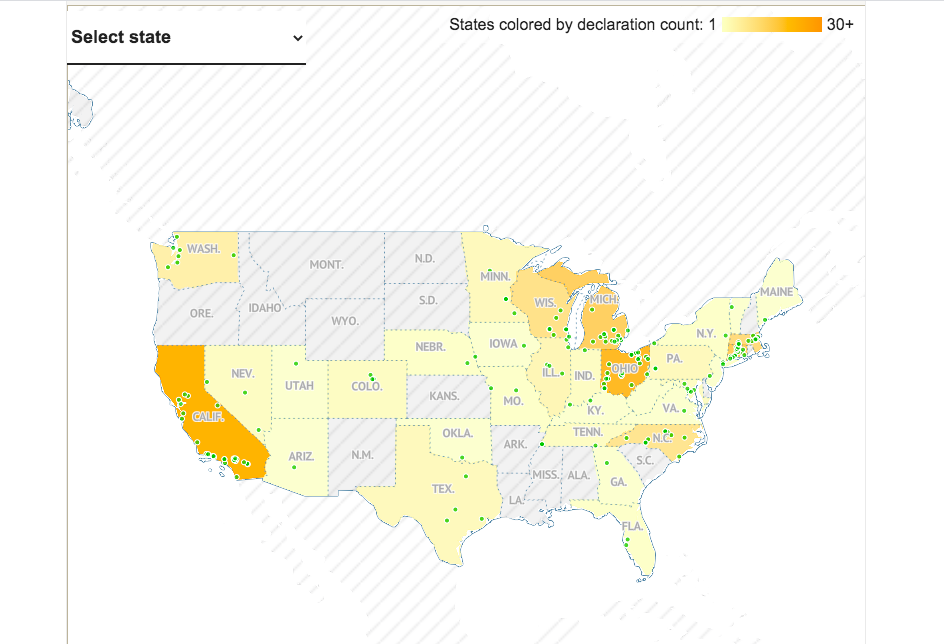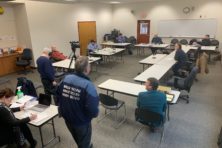County Supervisors Declare Racism a Public-Health Crisis
- Share
- Tweet
- Pin
- Share
After six months of discussion, debate and some training, the Door County Board of Supervisors resolved Tuesday that racism is a public-health crisis that affects our entire society.
The diversity, equity and inclusion resolution that passed 10-9 with two absent uses definitions from the American Public Health Association to define individual and systemic racism as a system that structures opportunity and assigns value based on how a person looks.
The resolution outlines how racism causes discrimination in housing, education, employment and criminal justice; recognizes that Wisconsin’s highest death rates at every stage of life belong to African Americans and Native Americans; and asserts a commitment to using diversity, equity and inclusion in its approach to all policies, procedures and projects to “dismantle institutional structural bias based on identity factors such as race, ethnicity, gender identity, sexual orientation, religion, disability, age and socioeconomic status.”
The resolution was not the one that advanced out of the Door County Administrative Committee on March 16 for the Tuesday vote. That resolution was a “vision statement” that contained softer statements – racism is a public-health crisis in “areas of our country,” for example – and required no direct action.
“It’s a watered-down, garbage resolution that just makes us look and feel good, when in reality, we did nothing” if it were to pass, said Supervisor Nissa Norton on Tuesday.
“If I were voting on this resolution in our packet, I would be voting ‘no’ in protest because it doesn’t have meaning or sincerity behind it,” said Supervisor Kara Counard.
The Administrative Committee’s version never received a vote. Instead, another version was introduced, motioned to the floor for debate and would ultimately pass. Supervisor Vinni Chomeau introduced that version, and it commits the county to taking action steps.
“If we don’t put in a way to do this work, it won’t be more than a piece of paper put into our resolution files,” Chomeau said.
The resolution she introduced requires county administrators to submit a timeline within three months for accomplishing actions that must also be allowed for in the 2022 budget. Those actions include diversity, equity and inclusion training; creating a diversity, equity and inclusion advisory committee; and data collection and analysis on identity factors such as race, ethnicity, gender, gender identity, sexual orientation, religion, disability, age, and socioeconomic status.

It says these actions are an “important first step in the movement to advance racial equity and justice and must be followed by allocation of resources and strategic action.” APHA states that racism is a driving force for the social determinants of health, such as housing, education and employment, and its reports describe how those issues are intimately connected with health outcomes and health equity.
Taking only one of those topics, the organization outlines how neighborhoods can provide residents with safety, recreation, access to transportation, healthful food and jobs – and how those neighborhoods are unavailable due to either individual or institutional racism. Source: apha.org.
Chomeau’s version of the resolution aligned more closely with the Door County Legislative Committee’s original vision, as articulated in the resolution it originated on Sept. 10, 2020. That committee spent two meetings crafting its resolution before sending it to the full county board in October, when it was tabled to grant time for more study and training.
The supervisors have discussed the issue at every county board meeting thereafter until passing the resolution Tuesday. All supervisors who were able and chose to do so also attended a free webinar series on diversity, equity and inclusivity offered on four consecutive Mondays in February by the Wisconsin Counties Association.
The monthly county board conversations had reached a tipping point by the time the vote was cast Tuesday. Supervisor and Vice Chair Susan Kohout said it had been the single most important and difficult issue the supervisors had dealt with during her nine years on the board. And she said she felt they were failing.
“At this time, the board is no longer working,” she said. “All of us are frustrated and angry at at least one other board member, if not many.”
The discussions during the meetings have focused largely on the need for training and what form that should take. Some supervisors used statistics to support their views about why racism is a public-health crisis. Others shared anecdotal stories of local racism.
“We’ve heard story after story of flagrant racism here,” said Supervisor Bob Bultman on Tuesday. “These instances have shocked and awoke me from what I assumed was an era bygone.”
The majority of the discussion on the floor during the past five months has come from some supervisors trying to convince the other supervisors of the need for action.
“We can do our piece in moving this forward so our kids aren’t dealing with the same thing we have never solved or done our part to improve,” Kohout said during the January meeting.
“Quite frankly, we are not a diverse county board – not in any way, shape or form,” said Supervisor Megan Lundahl during the February meeting. “So this is a huge blind spot for us, and we have the opportunity to address that blind spot and have that happen in a safe space where people aren’t afraid of being labeled and called names.”
But that safe space had vanished during the past five months, Supervisor Todd Thayse said in February.
“If you weigh in on this topic, other than fully supportive or on board with more training, you’re likely to be labeled,” Thayse said during the February meeting.
Not all supervisors were convinced the issue was relevant in Door County, a position Door County Administrator Ken Pabich gave voice to.
“In a place like Door County with not a lot of diversity, maybe it’s not the best place to start,” Pabich said in February. “Let’s look at the data and see where inequities are. Where are we missing the mark in our own performance as a county?”
By the February meeting, little new information had been offered, and the supervisors seemed entrenched in their respective positions. Impatience for action was evident on all sides.
“We’ve tippy-toed around this for months,” Thayse said in February. “As it relates to the business we’re here to do, I’m of the opinion we’re spending a lot of time moving the cup back and forth on this thing. Those who have taken the training have taken it, and we should vote on this resolution, up or down.”
The supervisors voted during that February meeting to send the resolution to the Administrative Committee so it could craft its own version and return it to the full county board – the version that Chomeau’s resolution superseded.
The nine supervisors who cast dissenting votes on Tuesday remained largely silent during the discussion. One exception was Supervisor David Englebert, who sits on the Administrative Committee. He acknowledged the division on the topic among those on the board and within the community, but he said he saw unity among his constituents, who had been shaped by their community, as he had been, beginning with his Belgian great-grandfather, who arrived in the 19th century.
“We have religious values and norms that may not be perfect, but that’s what shapes us,” he said. “Try to go too far, too fast, even if they’re the biggest issues outside Door County, and the people ask what we’re doing. I have to vote what my constituents feel and vote the amendment brought forward [by the Administrative Committee].”
The Votes on Racism as a Public-Health Crisis
There were two votes on the floor Tuesday: the first to approve the amendment submitted by Supervisor Vinni Chomeau, and the second to approve the then-amended resolution, which essentially replaced the Administrative Committee’s resolution with Chomeau’s version.
Both votes passed 10-9 with two absent – Supervisors David Enigl and Laura Vlies Wotachek – yet a couple supervisors changed their vote between the first and second versions. Here’s how the votes were placed.
First vote, in favor: Bob Bultman, Vinni Chomeau, Kara Counard, Alexis Heim Peter, Susan Kohout, Megan Lundahl, Nissa Norton, Morgan Rusnak, Richard “Biz” Virlee and Dale Vogel.
First vote, against: Dan Austad, Dave Englebert, Roy Englebert, Ken Fisher, Elizabeth Gauger, Joel Gunnlaugsson, Dave Lienau, Nancy Robillard and Todd Thayse.
Second vote, in favor: Bob Bultman, Vinni Chomeau, Kara Counard, Roy Englebert, Alexis Heim Peter, Susan Kohout, Megan Lundahl, Nissa Norton, Morgan Rusnak and Dale Vogel.
Second vote, against: Dan Austad, Dave Englebert, Ken Fisher, Elizabeth Gauger, Joel Gunnlaugsson, Dave Lienau, Nancy Robillard, Todd Thayse and Richard “Biz” Virlee.

